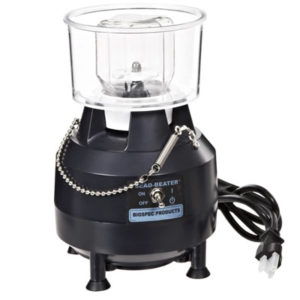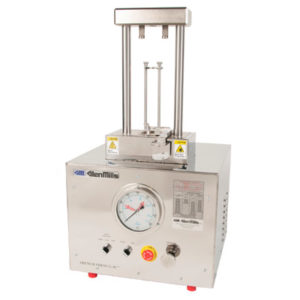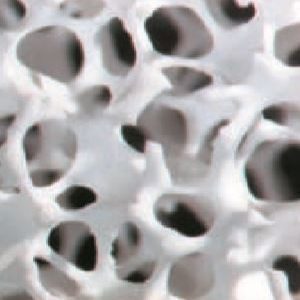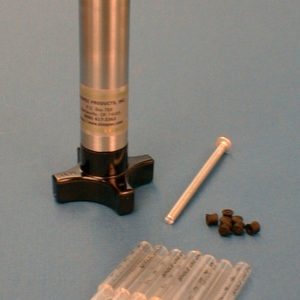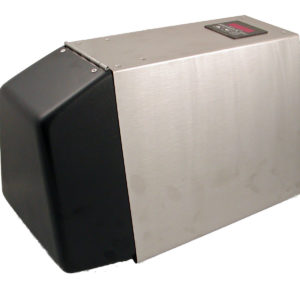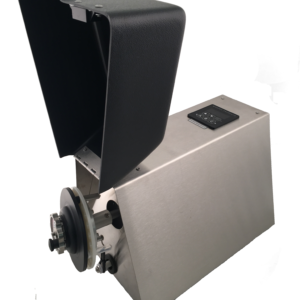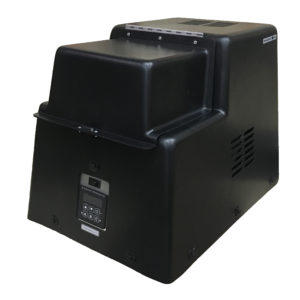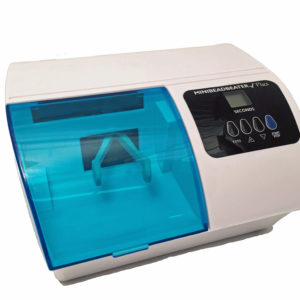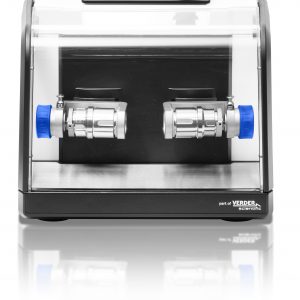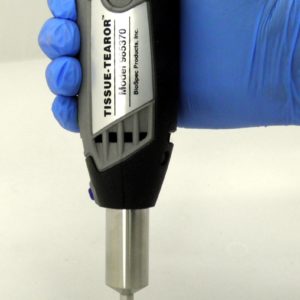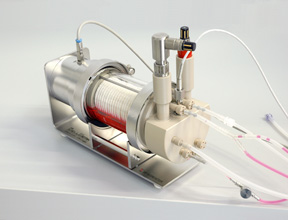Cell Disruption and Culture
Showing all 11 results
-
BeadBeater
BeadBeater
The BeadBeater disrupts microorganisms, single-cell preparations and pulverized plant and animal tissue with better than 95 percent efficiency. Up to 80 grams (wet weight) of cells can be processed in a typical three minute run. Relying on a unique crushing or cracking action rather than high shear forces found with a French Press or sonicator, a Teflon impeller rotating at high speed forces thousands of minute glass beads to violently collide in a special clover-leaf shaped vessel. Cells are disrupted quickly, efficiently and safely in the sealed system. The apparatus is easy to clean, has a small footprint, requires no auxiliary supplies or equipment and is essentially maintenance free. Beads settle out in seconds and are reusable. The apparatus is easy to clean, has a small footprint, requires no auxiliary supplies or equipment and is essentially maintenance free. Beads settle out in seconds and are reusable.
The BeadBeater comes complete with a 350 ml polycarbonate chamber, rotor assembly, motor base, ice-water cooling jacket and one pound of glass beads of your choice.
- Ideal for isolating proteins, enzymes and intact intracellular organelles
- Powerful 3/8 HP motor. Only durable, non-toxic components contact product
- Designed for batches up to 80g (wet wt.) in 200 ml of medium
- Highly efficient disruption in shortest times possible
- Sample cooling during homogenization is simple and efficient
Controlling Heat
Like many mechanical cell disruption techniques, the Beadbeating process generates heat. In general for every minute of beadbeating there is a 10 deg rise in sample temperature. Should that be a problem, the ice-water jacket included with the BeadBeater helps keep this temperature increase under control. If you require even more temperature control, stainless steel or aluminum sample chambers are offered (see accessories).
SKU: n/a -
French Press
French Press G-M® High Pressure Cell Disruption
The French pressure cell press, or French press, is an apparatus used in biological experimentation to disrupt the plasma membrane of cells by passing them through a narrow valve under high pressure.
The French Press can also be used for disintegration of chloroplasts, homogenates of animal tissue, and other biological particles. It is capable of disrupting cell walls while leaving the cell nucleus undisturbed. The press uses an external hydraulic pump to drive a piston within a larger cylinder that contains the liquid sample. The highly pressurized sample is then squeezed past a needle valve. As the sample passes through the valve, the fluid experiences shear stress and decompression, causing cellular disruption.
A French press is commonly used to break the resilient plasma membrane and cell walls of bacteria and other microorganisms for isolation of proteins and other cellular components. The disruption of cells in a French press generates ‘inside-out’ membrane vesicles which are required for many in vitro biochemical assays.
SKU: n/a -
Cell Culture
Implant Blanks
Zellwerk GmbH supplies customized implant blanks from Sponceram® and other materials for research use. Blanks for medical use are in preparation. Implant blanks are easily colonized in our Z® RP Bioreactor equipped with implant-specific holding fixtures. E. g. is a moulded carrier of Sponceram® HA covered by primary chondrocytes embedded in their own collagen matrix. Under appropriate cultivation conditions these chondrocytes express Collagene II and Glucosamine Glucanes in physiological ratios indicating in vivo-like differentiation. Implant blanks made from Sponceram® are ideally suited to generate bone-like structures after colonisation with osteoblasts which calcificate even without addition of specific growth factors.
SKU: n/a -
MicroMincer
MicroMincer
The MicroMincer is a compact, hand-operated screw press which macerates 0.3 grams or less of soft** fresh plant or animal tissue (e.g. muscle, liver, brain, epicotyl and pulpy leaf tissue) without sample loss, heat generation, foaming or aerosol problems. Much of the sample, without added buffer, is pushed through a 250 micron stainless-steel sieve under thousands of pounds force. In the case of plant tissues, fibrous, cellulosic pulp is left behind while cell juice and intracellular products are extruded. The resultant extract can be deposited directly in microtubes.
The stainless steel MicroMincer utilizes disposable polypropylene liners. Thus, multiple samples can be quickly processed without a need to clean or risk of contamination between samples.
SKU: n/a -
BeadBeater
Mini-Beadbeater-16
The Mini-BeadBeater-16 disrupts microbial cells and plant and animal tissue by violently agitating four to sixteen 2 ml screw-cap microvials containing small glass, ceramic or steel beads and disruption buffer. Even resistant samples like yeast, spores or fibrous tissue are completely homogenized around 3 minutes in 0.1 to 1 ml of extraction medium. The non-foaming, aerosol-free method preserves enzymes and organelles. In the presence of nucleic acid extraction media such as phenol, Gu-SCN or a commercial kit solution, DNA and RNA are recovered in the highest possible yield. The method is ideal for PAGE, PCR applications and diagnostics using antibody or oligonucleotide probes. Because beads and vials are disposable, there are no cross-contamination concerns when homogenizing multiple samples.
SKU: n/a -
BeadBeater
Mini-Beadbeater-24
The Mini-BeadBeater-24 disrupts microbial cells and plant and animal tissue by violently agitating four to twentyfour 2 ml screw-cap microvials containing small glass, ceramic or steel beads and 0.1 to 1 ml disruption buffer. The performance of the Mini-BeadBeater equals or exceeds that of any other type or brand of cell disrupter. Even resistant samples like yeast, spores or fibrous tissue are completely homogenized in 1-3 minutes. The non-foaming, aerosol-free method preserves enzymes and organelles. In the presence of nucleic acid extraction media such as phenol, Gu-SCN or a commercial kit solution, DNA or RNA is recovered in the highest possible yield. The method is ideal for PAGE, PCR applications, and diagnostics using antibody or oligonucleotide probes. Because the beads and vials are disposable, there is absolutely zero cross-contamination between samples – essential for PCR techniques.
SKU: n/a -
BeadBeater
Mini-Beadbeater-96
The MiniBeadbeater-96 disrupts cells and tissue by violently shaking a sample inside a classic 2 ml microvial or standard deep well microplate partially filled with tiny ceramic or steel beads. Complete cell disruption is achieved in 1 to 3 minutes of beadbeating. A common application is nucleic acid extraction. Up to 400 mg of tissue is added to a vial containing glass or ceramic beads and a nucleic acid extraction solution…the later often being purchased as part of a nucleic acid extraction kit. The synergy of simultaneous mechanical cell disruption and nucleic acid extraction in a chaotropic solution gives very high yields of high quality RNA or DNA. Most protocols developed using smaller capacity models of the MBB are transferable with little if any modification.
The MiniBeadbeater can also be used for dry grinding. In this application, ceramic or steel beads are added to to vials containing hard, dry samples such as hair, bone, teeth, seeds and minerals. Softer materials such as biological tissue, rubber or plastics can be powdered by first pre-freezing the sample to liq N2 temperatures (called Cryo-grinding). Powdered material can be safely dissolved in an organic solvent in BioSpec’s XXTuff microvials, our stainless steel microvials or Porvair’s reinforced microplates, simplifying recovery of organic analytes. A solid aluminum vial holder can be utilized to maintain cryogenic temperatures during beadbeating (see the Accessories, below).
SKU: n/a -
BeadBeater
Mini-Beadbeater-Plus™
The new Mini-BeadBeater-Plus™ is a high-energy bead-mill designed to violently agitate up to a half gram sample of biological material sealed inside a 2 ml microcentrifuge vial containing tiny glass, zirconia or steel lysing beads. The grinding action of the beads (beadbeating) rapidly disrupts microorganisms and plant and animal tissue in 5-90 seconds. Being an upgrade of the venerable MiniBeadbeater-1, new features include a programmable timer, a more powerful brushless motor and 115/230 VAC compatibility.
Because cell disruption occurs inside sealed microvials, cross-contamination during homogenization is completely eliminated – an important feature for nucleic acid isolation. And time is saved because no clean-up is needed between samples. Sterile technique is easily accommodated for recovery of intracellular virus and bacteria from plant and animal cells and the non-foaming, non-aerosol method is ideal for recovery of enzymes, membranes and intracellular organelles.
The Mini-BeadBeater-Plus is also used for dry- or cryo-grinding. Heavier zirconia or steel beads and special breakage-resistant microvials are used. Hard samples such as hair, bone, teeth, seeds, and minerals are powdered in 5 – 30 seconds. All protocols developed with the Mini-BeadBeater-Plus are transferable to larger, higher-capacity MiniBeadBeater models.
SKU: n/a -
Cell Disruption, Cryogenic Milling, Grinding & Milling, Mixer Mills
MM 400 Mixer Mill
The mixer mill MM 400 is a compact versatile bench-top unit, which has been developed specially for dry, wet and cryogenic grinding of small amounts of sample.
It can mix and homogenize powders and suspensions in only a few seconds. It is also perfectly suitable for the disruption of biological cells as well as for DNA/RNA and protein extraction. With its high performance and great flexibility the mixer mill MM 400 is a unique product in the market.You may also be interested in the High Energy Ball Mill Emax, an entirely new type of mill for high energy input. The unique combination of high friction and impact results in extremely fine particles within the shortest amount of time.
SKU: n/a -
Tissue Tearor
Tissue Tearor
The Tissue-Tearor is a rotor/stator type tissue homogenizer which can rapidly homogenize, disrupt, and emulsify samples in 0.5 – 1000 ml of liquid. Complete homogenization of tissues (muscle, liver, breast tissue, etc.) is usually achieved in ten to thirty seconds. Little, if any, heat is produced during the process.
If you need a 230 volt unit, please select models that end in EUR. When ordering select one of our four different probe sizes – 04, 07, XL, and 14. Unlike most competitive Brands of rotor-stator homogenizer, THE TISSUE-TEAROR COMES COMPLETE WITH BOTH THE HIGH-SPEED MOTOR AND ONE STAINLESS STEEL PROBE OF YOUR CHOICE. See chart below for probe selection guidance. Additional probes are available. All are interchangeable with the TT motor unit. A cord-less variety of the TissueTearor is also available with model numbers ending in CL.
SKU: n/a -
Cell Culture
Z® RP Cell and Tissue Culturing
Z® RP Technology
The Z® RP cell- and tissue culturing systems establish a unique technological platform for fast and controlled expansion of adherent cells. Complying with GLP, GCP, GTP and GMP standards Z® RP culturing systems enable users to grow cells in very high densities, inducing tissue-like organisation of cells embedded in their own extracellular matrix.
Zellwerk’s Z® RP technology opens up completely new perspectives for regenerative medicine being the ideal tool for expansion and harvesting of primary cells and stem cells. The scope of therapeutical applications also includes tissue engineering and even production of complete implants made from colonized scaffolds. Moreover, the compact Z® RP cultivation system allows cost-efficient production of recombinant biopharmaceuticals, vaccines, vectors e. c. Researchers profit from the variability in culturing configurations speeding up development projects significantly.SKU: n/a

